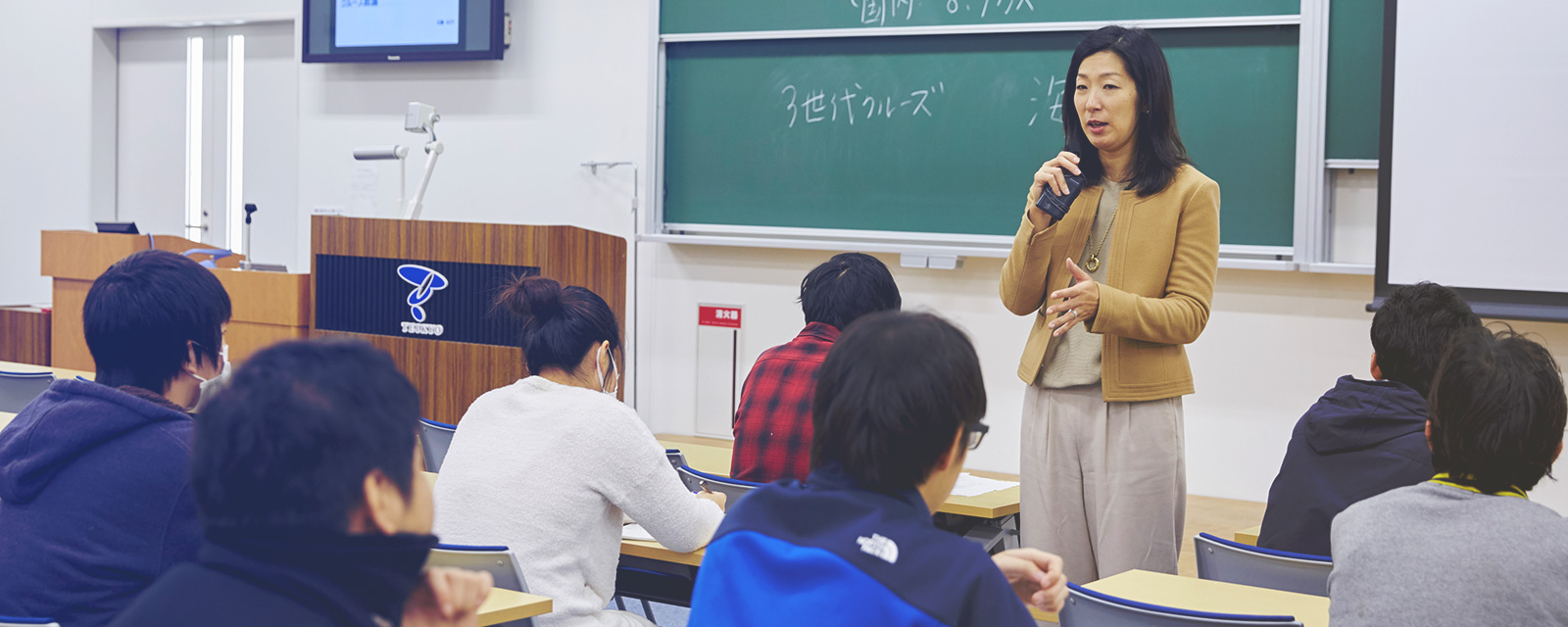
- 宇都宮キャンパス
経済学部 地域経済学科

- 宇都宮キャンパス

地域の新しい価値を共創するための
理論と実践手法を学びます
地域の活性化・再生を実現させることのできる人材を育成すること。それが地域経済学科の目標です。基本的な経済学科目のほか、「旅行産業論」「地方自治法」などといった科目を用意。“地域と経済”をあらゆる角度から検証、学習できます。また、地域密着型シンポジウムなども開催しているので、実際に地域の第一線で活躍している異分野の方々から地域活性化に対しての現状・課題・解決策といったリアルな現状を学ぶことも可能です。
地域で活躍する卒業生シリーズを発刊しました
地域経済学科は2011年4月に開設し、2024年3月には第10期生を社会に送り出します。それを記念し「地域で活躍する卒業生」をテーマに、さまざまな分野で活躍する卒業生にインタビューをしています。現在の仕事、やりがい・大学での学びで役立っていること・学生時代の想い出など、在学生はもちろん受験生にも参考になる冊子です。
宇都宮キャンパスリカレント教育プログラム
地域経済学科が中心となって栃木県内の産学官金の諸団体と連携し、企業経営者と学生が一緒に学ぶ「学び合い」のリカレント教育プログラム(令和6年度補正予算の文部科学省補助採択事業)を実施しています。若者の地元定着による地域活化性と地域企業の人財採用力・定着力の向上について栃木県内で活躍する企業経営者とともに学ぶことで、栃木県内企業で働く意味と魅力が発見できます。
地域「で」学ぶ、地域「に」学ぶ-現場での調査・活動をふまえた取り組み
従来の学問体系では説明困難な複雑化する現代において、経済学的視点を基盤にしながら、実際に現場に立つことで課題解決に向けた視点を提示するための取り組みを重視しています。本学科のフィールドワークでは、観光・地域経営・農業・財政・国際・都市計画・まちづくり・居住・防災・など、さまざまな分野で実践しています。
近年の社会では、異なる組織や地域間での連携や協働から、さらに新しい価値を創造するための共創が求められています。そのための方法として、本学科では「経済学系」「地域社会・産業系」「地方自治・行政系」の3つの系統のもと、フィールドワークを重視した実践的な教育と研究を行っています。また、学生自身が主体となって取り組む少人数の演習科目(ゼミ)を1年次より設置し、地域調査のための基礎力を培います。2年次以降の演習では、自身の興味・関心に合わせ、より専門性の高い研究領域に向けた分析や、発表のための応用力を実践力を養います。
公務員教養
憲法の条文や判例の解説を交えながら、公務員試験にも対応できる、憲法の基礎的な知識を習得するための授業です。条文を丸暗記するのではなく、なぜそのような条文ができたのかを理解することで、法律が誕生した時代背景や立法された意図を知ることができます。取り扱う条文によっては時事ニュースも取り入れながら解説されるので、法をより身近に感じることができる授業です。
中小企業論
地域経済の発展、日本経済の再生のかぎを握るとされる中小企業について、さまざまな角度から理解を深める講義です。経営環境の変化に対応する新展開やイノベーション、地域経済に果たす役割について、特色ある企業を例に考えていきます。
社会調査法
社会で生じる事象や人びとの意識を理解するために、現場に行き生のデータを収集・分析し、実証的に捉える活動が社会調査です。この講義では、量的調査の概要と手法を学び、実際の演習を通して社会調査の基礎的な知識と技術を身につけます。
観光産業論
宿泊業、旅行業、運輸業を中心に、テーマパークやコンベンションなどの観光産業の歴史、経営、法律、現状と動向など多岐にわたって内容を解説します。近年、日本で市場拡大をめざすクルーズ産業といったテーマも取り上げ、観光産業の今も学習。観光関連企業で働く現役社員による講演会では、実務の楽しさや難しさをはじめ、観光業界への就職につながる知識も学べます。
GPA(Grade Point Average)制度の導入の趣旨は、1. 学部として統一した基準を作成すること、2. 公平性に優れた基準であること、3. 国際的に通用する基準であることとし、学生の学修の成果をGPAという客観的な数値で評価するものです。またこの制度は、外国の多くの大学が採用している成績評価制度に概ね準拠しており、海外留学、海外の大学院進学、外資系企業への就職などの際に、学力を証明する指標として国際化に対応した成績評価制度となっています。
| 区分 | 評価 | GPA | 成績評価基準 | 評価内容 |
|---|---|---|---|---|
| 合格 | S | 4.0 | 90点以上 | 非常に優れた成績を表します |
| A | 3.0 | 80点台 | 優れた成績を表します。 | |
| B | 2.0 | 70点台 | 妥当と認められる成績を表します | |
| C | 1.0 | 60点台 | 合格と認められる最低限の成績を表します | |
| 不合格 | D | 0.0 | 59点以下 不合格 | 合格と認められる最低限の成績に達していないことを表します |
| 欠席 | 0.0 | 試験を欠席 | 当該授業の試験の未受験やレポート等の未提出を表します | |
| 無資格 | 0.0 | 受験資格なし | 当該授業の出席日数不足により受験資格がない、または履修放棄したことを表します |

| 授業の方法 | 授業時間 | 準備学習(予習、復習) |
|---|---|---|
| 講義・演習 | 15時間~30時間 | 30時間~15時間 |
| 実験・実習・実技 | 30時間~45時間 | 15時間 |
卒業するためには、4年以上在学し124単位以上修得しなければなりません。また、卒業に必要な最低単位数の内訳は下記の通りです。
| 科目区分 | 単位数 | 備考 | ||
|---|---|---|---|---|
| 必修科目 | コミュニケーション科目 | 8 | ||
| 専門科目 | 12 | |||
| 選択必修科目 | 専門科目 | 18 | ※選択必修科目の超過分は専門科目の選択科目に算入できます | |
| 選択科目 | 総合基礎科目 コミュニケーション科目 | 86 | 16以上 | |
| 専門科目 | 62以上 | |||